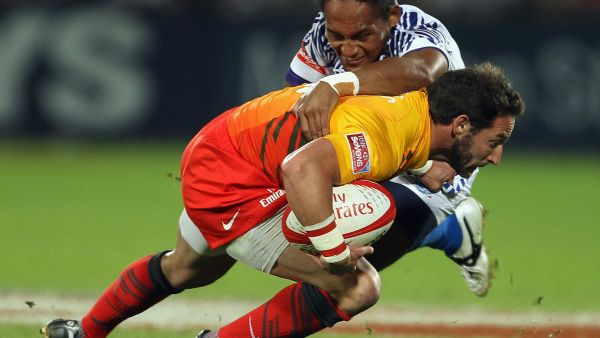Rugby has always been considered a game for the gentleman and the sportsman. Lebanese sport is so often tainted by relentless crowd disruption, administrative incompetence, political interference and corruption; it is no surprise that Lebanon’s sprouting rugby team has yet to fall into that trap. Alex Jammal is the chairman and a founding father of the Lebanese Rugby Union and is still an active player despite having played his first rugby game nearly 40 years ago. Since Lebanon’s first match against a British Naval ship that had docked in Beirut for a few days, Jammal has overseen the growth of rugby in Lebanon. “I went to school in England which is where I developed my passion for the game. I moved to Egypt in ‘79 and founded Cairo rugby club with a [friend] before moving back to Lebanon in ‘92,” said Jammal, “I worked in banking and other businesses but since 2009 I have committed about 75 percent of my time to developing the rugby federation, and it was much harder than I thought.” In 2009, Lebanon were accepted as a full rugby union federation and joining the Asian Rugby Union Federation and were accepted as an associate member. After hiring a New Zealander to help develop Lebanese rugby, the attitude changed from a Corinthian past time to a serious sport. Within just a few months of becoming an official federation, Lebanon hosted and won the Beirut Sevens, beating Jordan in the final. A trip to the world famous Dubai Rugby Sevens followed, although success did not continue. “We didn’t do so well because we were playing in a new league but it was a great experience for us,” said Jammal. With green space at a premium in Beirut, and across the country, the federation courted local schools in a bid to find a new generation of players. While the federation was able to make significant inroads in schools – such as Jamhour school, IC school ACS school and Broummana high school, all in Beirut – it struggled to win over the universities. “We weren’t very successful because the rugby league beat us to it,” Jammal told The Daily Star, “We’re working on getting a younger team and pushing the schools. Hopefully we’re going to be making big head way with the universities. If we can get in with five or six of the universities, they will provide the backbone for future teams.” From there, Jammal held a trial game in March 2010 between the schools and the local clubs – Beirut Phoenician, the Jamhour club, Ahed and the Rayan club – to go to Dubai in April to play in the first Arabian seven aside rugby tournament. It was the first tournament the Lebanese team played as nationals, rather than expats, eventually going on to win the competition. A month later, Lebanon played its first ever full international in Dubai as part of the Asian rugby federation playing Jordan, who Lebanon beat 27-18, despite the Jordanians’ arguably greater pedigree. The victory is just one of a number of achievements Jammal has masterminded in terms of Lebanese rugby. “We were the first Middle Eastern country to send a team to the University World Cup last year. “That was held in Portugal but we didn’t do so well because we only had a [pool] of 15 whereas the next country to us had a 1,000 players to choose from [while] Russia had 10,000. Everyone was impressed by us and we won one game against Norway in our final match 60-0 which was a great experience for us.” With performances improving with every match, Jammal now has an eye on the future, with the former businessman harboring lofty ambitions. “Our aim is to lease some land and include the rugby league in bringing everyone to train together. “We’re aiming for the World Cup of Universities in France [in 2012], the Asian Games in 2014 and then the Olympics in 2016. Beyond that we want to be in the World Cup 2019, its in Japan so we have a chance.” To help achieve this, Jammal has approached the world’s embassies in the hope they may loan Lebanon a professional coach as well as contacting other rugby federations in an attempt to recruit players from countries such as England and France for players of Lebanese origin. “We want to concentrate on local players obviously but in internationals we want a bit more experience and quality that you can’t get in Lebanon because they don’t play many matches,” said Jammal. “We’re in the process of asking every international rugby federation if they have any players of Lebanese origin that they could put us in touch with. We’re trying to convince Qatar to allow rugby in the Arab games in 2011. We would have a good chance, I don’t if the Moroccans or Tunisians would participate, if not we would have a good chance because have already won [a pan-Arab tournament] in Dubai.” “I’m not after glory or money – there’s no money in it, if anything it costs money – but my pleasure is in watching the game grow and develop.” Jammal may not court success but it may find him. By Kenny Laurie

Rugby has always been considered a game for the gentleman and the sportsman, though it doesn't always look that way.







